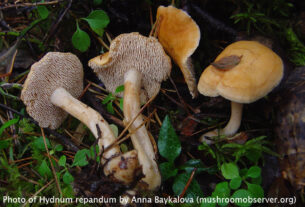Mushrooms are having their time in the spotlight. So it’s only natural that as people are becoming interested in the fungi, they’re going to want to go out to the woods, forage for wild mushrooms, and cook up a meal! Free food, right? Well, only if you know how to identify them.
While many people learn how to safely forage for mushrooms from local mycology societies or from family traditions, some will seek books to guide their way. Whether for how to find mushrooms in the forest or how to cook them up in the kitchen, there are many options by well known authors who care about the safety of the reader. Yet in the age of artificial intelligence it has become possible for almost anyone to create and publish a book within less than 24 hours.
This means the sites like amazon are being flooded with books written by unknown authors! From guidebooks to cookbooks, there are many well presented, beautifully titled books that have appealing excerpts and anecdotes. They can even have fake reviews stating how great the book is!
Here is your warning: this is literally a life or death situation. As the New York Mycological Society shared online: “ Amazon and other retail outlets have been inundated with AI foraging and identification books. Please only buy books of known authors and foragers, it can literally mean life or death.”
But what’s the issue? Aren’t AI generated books labeled as such? As of yet, there is no way to enforce regulation on whether a book was genuinely written or produced by AI. There are many articles available about the difficulty of determining whether something was written by a service like ChatGPT. The technology has become very advanced too quickly and we will most likely not be able say whether something was written by AI or not. Why? Because the AI writings, in many cases, are already surpassing the quality of writing of many authors. But beyond enjoyable writing, we need information to be factual, accurate, and safe when it comes to subjects like foraging, cooking, and anything else related to human or ecological health, and in these areas the AI output is still lacking.
Currently books can be published on sites like Amazon by just about anyone. Simply create an account, upload your book, and it becomes available for people to purchase. You hadn’t heard? Print on demand publishing is prevalent and does not include editorial oversight for accurate information! This is how so many books by unknown authors are making it to peoples’ search results. Books that may guide someone to consuming deadly mushrooms rather than the safe ones.
“Are mushrooms really that dangerous?!”
Mushrooms can be absolutely lethal. As Sigrid Jakob, president of the New York Mycological Society, told Samantha Cole of 404 Media, “There are hundreds of poisonous fungi in North America and several that are deadly. They can look similar to popular edible species. A poor description in a book can mislead someone to eat a poisonous mushroom.”
So, how can we keep ourselves safe?
We must seek to read books written by authors that we know and respect. But who earns our trust in this day of social media fame? Popular names do not necessarily equate with professionals. It has become easy to go viral on places like TikTok or Instagram and having massive followings do not necessarily indicate that someone has studied a subject extensively. We must remember that the most famous people are a result of interesting information and marketing more than anything. Fame and gimmick are not enough, we must look to community connections.
“Hey kids, don’t take candy from strangers!”
Our true guides are people that have proven themselves for having quality information to share with the world. “A lot of professional mycologists have worked extensively with mushrooms but don’t have a large following,” says Max Mudie, mushroom photographer and founder of the All Things Fungi Festival in England. “With the All Things Fungi festival we’re creating a platform for experts to share their knowledge and accurate information with people.”
Just as we urge kids not to take candy from strangers, we must not take advice on mushrooms from total strangers either. As important as the title and the contents of a book is the author and their credentials. Click on their name and search to see who they are in the world. No results? Think twice, and ask around.
We want to read guidebooks by people that go out and search for mushrooms safely and who successfully teach others to do the same. We want cookbooks written by people that have actually made the recipe that they’re suggesting to us. That means we need people with experience, but the very people with experience are not necessarily spending their time on social media earning our attention.
A great example is Nicholas P. Money. Search his name and you will quickly find statements like “Nik is an expert on mycology and has authored a number of books that celebrate the diversity of the microbial world,” on his professor profile page at Miami University in Oxford, Ohio. He has his own website, and an amazon search of his name reveals many well reviewed books. Yet as of September 11, 2023, his instagram profile features only 50 followers and 2 posts from 2017. A large social media following does not equate to being a voice of authority on a subject and we must remember that as we evaluate who to trust and who we believe is real.
Presence in events featuring people that successfully work with, forage, and cook wild mushrooms should be at the center for who we gift our trust to when deciding what books to buy. Attend mycology fairs and festivals and choose professors, mycology society members with known connections, and educators that have proven themselves to assist in people safely interacting with the mushrooms. Look for people that are repeatedly invited to speak at the many mushroom festivals and events around the world.
We must elevate educated people that have aligned with fungi for the betterment of humanity. Check the reviews and evaluations. Look at the foreword and draw conclusions as to why the book was written. Read everything with a grain of salt, that is to say, be skeptical until you truly feel safe enough to interact with the fungi. Remember that teaching yourself to forage from books alone is not recommended by any professional that truly cares for community safety. Confirmation bias and the desire to successfully find wild mushrooms can lead an individual to misidentify extremely toxic mushrooms. Allow your community to assist you in safely foraging and know that you will be wrong in your identifications along the way!
As we enter the need for ever increasing digital discernment in the face of AI productions, we give you the most obvious advice. Connect with other humans that successfully interact with mushrooms. Learn together. And most of all, make sure that you are reading books and references from real people that are dedicated not just to profits but to your safety and success with mushrooms.




